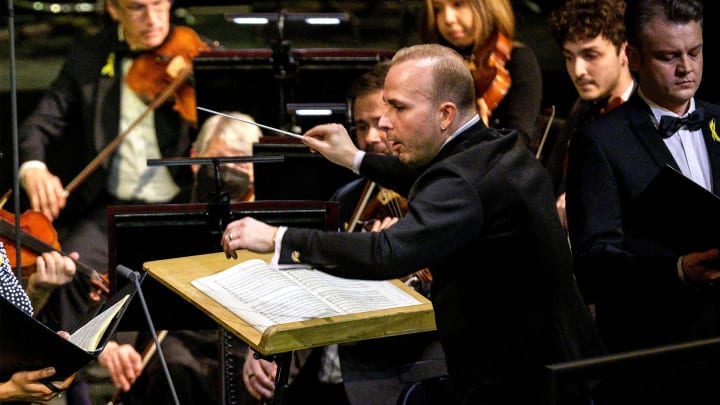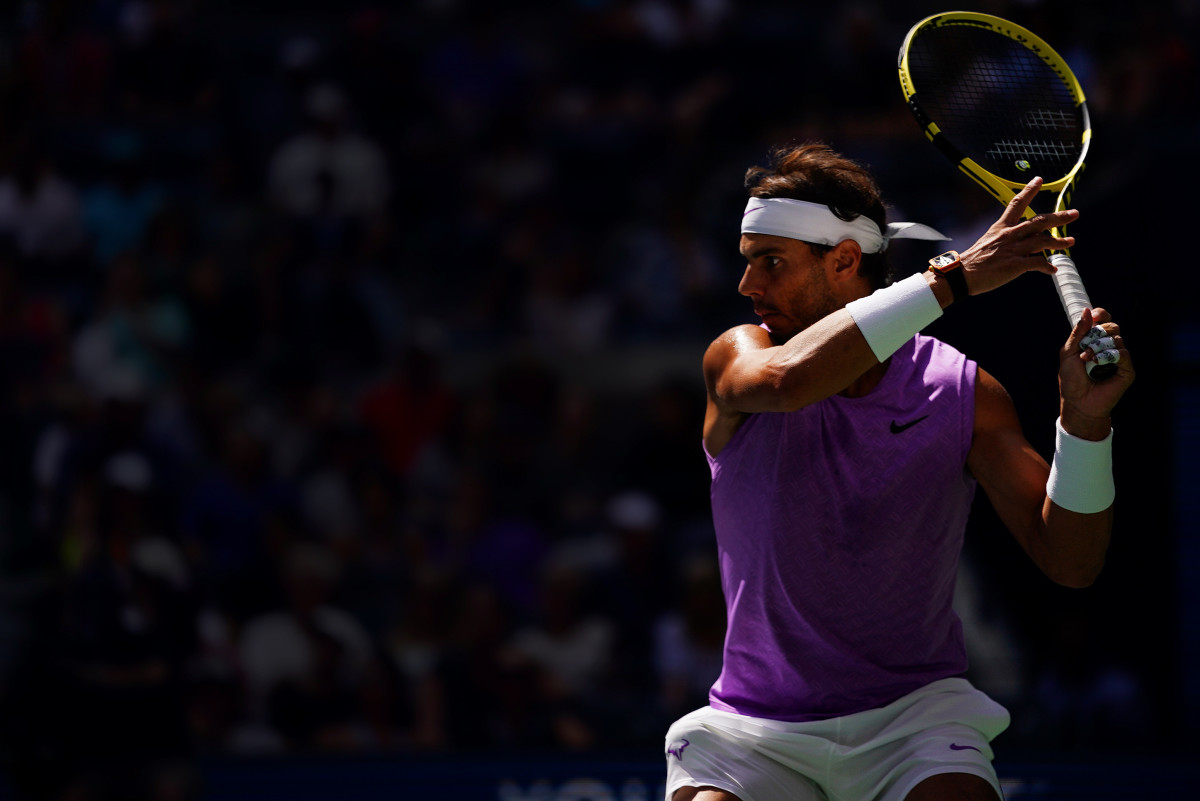Q&A: Ahead of U.S. Open Performance, Met Opera Director Says Music And Tennis Have Similarities

Sunday’s U.S. Open men’s final will feature the tournament’s two remaining headliners. As major productions go, you’d also be hard-pressed to find a stronger opening act. Before the match, Arthur Ashe Stadium will turn into a 25,000-seat concert hall as Grammy-winning opera baritone Will Liverman performs “America the Beautiful/Lift Every Voice and Sing.” He’ll be accompanied on piano by Yannick Nézet-Séguin, the Metropolitan Opera music director, who also directs the orchestras in Philadelphia and his hometown of Montreal.
As if he didn’t have enough jobs, Nezet-Seguin recently finished up an as adviser on the forthcoming Bradley Cooper film “Maestro,” a biopic of Leonard Bernstein. The irony: Nézet-Séguin is the anti-maestro, a creative force without the towering ego.
A conductor who operates in his own key, Nezet-Seguin, 48, comes to rehearsal clad in Jordans and hoodies, his tattoos poking out from his rolled-up sleeves. Recalling a certain sport, he takes pains to show that opera and classical music is not just the preserve of the elite and the merchant class.
Yes, he is a hardcore tennis, fan, too, one who has named his cat after a favorite player (a certain Spanish lefty), who follows both tours and even shares an agent with Felix Auger-Aliassime. In advance of his performance before Sunday’s final, he spoke with Sports Illustrated.
This interview has been lightly edited for clarity.

Sports Illustrated: Tell me about your relationship with tennis.
Yannick Nézet-Séguin: Yes, the relationship with tennis has a lot to do with Nadal’s career. When I was very, very young, I witnessed Boris Becker’s first win in Wimbledon. I watched that on TV because my father was a fan of tennis and I got interested in those years. Becker, Lendl and then, I have to say, I kind of stopped watching tennis and I became interested only about music. In 2004, when I started my guest conducting career in various cities, I happened to be in conducting the Philharmonic, the Monte-Carlo. And it was the week [of the tournament], so I decided to surprise my father and buy tickets for the final.
I was not so interested. But that was the first final that Nadal won. Oh, that’s great. So he was new, it was new and I just fell in love with the game, with the guy. It was what I needed. It just fulfilled something in my life that I needed, a kind of inspiration.
When you’re conducting, there's a lot of people around, but at the end of the day, you’re alone. You have to find the solutions yourself. There’s no coach. Some matches are so long—it’s a bit like a long Wagner opera—but I drew so many parallels. Then I started getting interested to a point of obsession of watching everything I still feel— as all of us do— just blessed that I was able to live fully and being alive during this Nadal-Federer, once-in-a-generation rivalry. So this is how it started.
SI: You see overlap between music and tennis.
YNS: Completely. First, the fact of having very strict rules and a certain timing and pacing. But it’s especially what strikes me is—I know it sounds almost negative when I say it—the loneliness of it. But that finding the solutions yourself, not only on an intellectual level, but an emotional level, is really one of the things that makes this sport so great.
And I see the parallel with music. As a conductor, I’m very physical, so I see more the sports discipline that I need to have with what I have to eat, the way I have to sleep, the way I have to take care of my body in general. And I think we, it would be good for many musicians to be a little bit more attuned to some sports, especially tennis. Of course tennis is also a game that’s beautiful to watch the different styles. I find that the poetry of watching the ease with which Federer was doing everything and the passion with which Nadal was doing everything is contrasting, but it's also like watching two different—or listening to two different musicians.

SI: I'm guessing you can relate to the travel. One day they’re in New York, and then everybody leaves for Davis Cup in Croatia, and then they’re in Vancouver for Laver Cup. That sounds like your schedule.
YNS: Yeah, absolutely. Maybe in my mind it's a bigger thing—which I admire so much—but it’s dealing with the elements, dealing with the conditions. You’re never fully in control. You spend your whole entire life to try and control the circumstances, but you can’t control them and the most successful players—and dare I say, the most successful artists—are the ones who are able to adapt to the circumstances and make it their friend. Whether it’s the wind condition, the humidity, the sun, the heat, the cold, the jet lag, or having to wait for so long and then go on [court]. It is of course very physical, but it’s very, psychological.
And that’s definitely something that I relate to very much. I go one week to conduct something in Vienna, you know, it’s a different orchestra. They will have a different flute player, different sound of the violins, different traditions. And I have my own interpretation. But I have to adapt to whatever the circumstances are, or their tradition is.
Some things feel more familiar over time, like also in tennis. You know, if people keep going to the same tournament for 10 years, they know they can anticipate what they’re going to have, so they can prepare differently.
That’s something that I wish people would talk about a bit more, how the real strength is to adapt to the circumstances and make them not antagonize yourself. And I do know something that’s a little different, I guess, between music and tennis, is that some players in tennis feel the need to get upset or angry at something and they’re fired by this kind of energy of getting angry at themselves and therefore that makes them win. I don’t really believe that this parallel to draw with music, but who knows, maybe it works for some people, but it doesn’t work for me, that’s for sure.
SI: You don’t break your baton when you get upset.
YSN: No. [Laughs.]
SI: You mentioned how musicians should be watching more tennis. What would you tell tennis fans about embracing music and opera?
YNS: I think tennis may be the most artistic sport in terms of creativity, style, elegance, class. But when I say class, I don’t mean like upper class—tennis is trying to get rid of this kind of image that you know, tennis is only for the wealthy. What I mean: It’s a beautiful sport where it’s not about fighting. Classical music and opera in general is also something that you can just sit and watch people really sweat and give their all at the service of something that’s very beautiful. It’s a very human experience when you see people giving their all on their instruments and sweating it.
It's maybe what can draw sports fans who probably sometimes think, Oh, I love sports. I don’t really like art. But maybe they forget that great art, the way we do it, is also witnessing a human reaching the peak of or outdoing themselves and just going beyond their human limits.
I spoke a few times with Felix about it. Because Felix plays the piano, he’s always curious to hear about music as a parallel to his process. He was always thinking about mistakes, how to get a perfect game. He sees musicians like me and was saying, “Oh, you don’t make many mistakes. We always have unforced errors.” I said, “We make many mistakes! We, too, always strive for perfection. It’s never perfect because if it were, we wouldn’t day after day try to be better. So, that’s maybe another common thing.”
